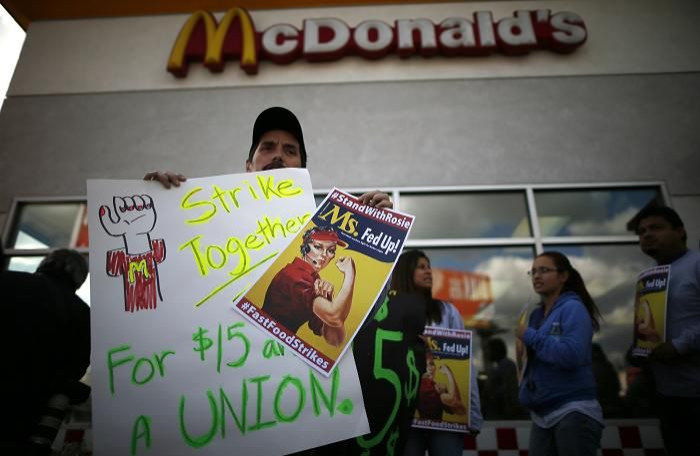National Labor Relations Board Paves Way For Union Organizing At McDonald's And Others With Franchises, Subcontractors

More than two years ago, the so-called Fight For 15 launched high-profile protests at fast-food joints with what seemed like an audacious demand: "$15 and a union." Since then, several major cities have moved to meet the first part of the rallying cry. Now, a landmark ruling from the National Labor Relations Board has brought the slogan's other half within striking distance.
In a 3-2 decision that brings sweeping new legal accountability to fast-food corporations and other employers that rely on franchisees and subcontractors, the National Labor Relations Board (NLRB) has expanded its definition of what constitutes a “joint employer.”
“It is not the goal of joint-employer law to guarantee the freedom of employers to insulate themselves from their legal responsibility to workers, while maintaining control of the workplace,” wrote a majority for the board, which oversees labor relations in most of the private sector. “Such an approach has no basis in the [National Labor Relations Act] or in federal labor policy.”
The decision stems from workers' attempts to organize a union at Browning-Ferris Industries, a New Jersey waste management company. But its significance extends to workplaces across the country.
McDonald’s and other fast food companies have long argued they do not bear responsibility for the actions of their franchisees -- a line used to deflect accusations of labor law abuses, discourage the possibility of union organizing, and reject demands to meet worker advocates at the bargaining table.
The NLRB ruling does not force employers to abandon their use of franchisees or subcontractors. It does, on the other hand, put pressure on such employers to confront labor complaints and demands that occur across their contracting chains. It paves the way for these parent companies to recognize unions that subcontracted and franchised workers and face potential charges of unfair labor practices that any of them file.
Under the board’s old standard, bosses generally needed to exercise direct control over the terms and conditions of employment in order to be considered “joint employers.” But in its Thursday ruling, the agency said a company that exercises more indirect forms of control or reserves the authority to do so can be deemed a “joint employer.”
The NLRB defended its move as a necessary response to changes in American employment practices. It noted that “the diversity of workplace arrangements in today’s economy has significantly expanded” and “the procurement of employees through staffing and subcontracting arrangements or contingent employment, has increased steadily.”
Among other figures, the board cited numbers from the Bureau of Labor Statistics that show employment in the temporary help services industry, a subset of contingent work, roughly doubled from 1990 to 2008, reaching 2.3 million workers.
Labor and business groups immediately tussled over the decision’s significance.
“The decision will force franchise and contract businesses into a one-size-fits-all business model when it comes to liability and wage issues,” said Iain Murray, vice president for strategy at the Competitive Enterprise Institute, a libertarian think tank funded by the restaurant industry. “That may be good for labor union bosses and trial lawyers in search of big targets of opportunity, but it will hurt anyone who now benefits from flexible work arrangements.
“Corporate lobbyists will no doubt raise the alarm that this decision dooms subcontracting,” said Christine Owens, executive director of the pro-union National Employment Law Project, in a statement. “That’s far from the truth. This ruling simply means that corporations that share control over operations cannot feign ignorance or disclaim responsibility for illegal acts, especially when those acts flow from the business model the lead company imposes.”
© Copyright IBTimes 2024. All rights reserved.






















